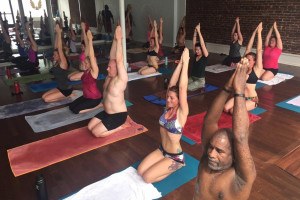Meet a Health Hero: Dr. Ted Corbin
» You can vote for Dr. Corbin here from August 22nd through September 18th.
Name: Dr. Ted Corbin
Role: Medical director of Healing Hurt People, a hospital-based violence intervention program with the mission of decreasing violence and trauma through public health policy, practice research and training.
What motivates you to try and make Philadelphia a healthier place?
I am a native Philadelphian and I see all the untapped potential in our youth. In our program Healing Hurt People at Drexel, we work with youth who have been victims of violence and we help them rebuild and mobilize their talents. As is true for all of us, healing for these young people starts with a healthy mind — figuring out what we need to do to be safe, not just physically but also socially, morally, and psychologically, managing emotions, dealing with loss and envisioning a future. Not an easy thing for anyone but once you’ve gotten there, it’s a beautiful space to heal, own, occupy and build.
Describe a health or fitness-related turning point in your life.
When I was an emergency medicine resident in Washington D.C., I found that due to the long hours and the constant flow of victims of violence through the emergency room, I was physically and emotionally spent. A close friend, who was a fitness instructor, pretty much forced me to start going to the gym with him. That was a turning point for me to experience how engaging my body was such a powerful way to reduce my emotional stress. I have never forgotten that connection.
I now know that social-emotional health is so connected to physical health and there are studies to prove it. It’s all about understanding what power the mind has so that it motivates what the body can do physically and vice versa. In practical terms now, I feel great after a workout, and I am ready to write, work, care, and relate.
What policy would you institute to make greater Philadelphia a healthier region?
Stress is the greatest threat to our collective health as a city. I also believe that emotional and physical well-being are strongly connected. I would create spaces for mindfulness stress reduction activity in every neighborhood and every system — education, healthcare, behavioral health, justice [juvenile and adult], and workplaces. Mindfulness practices are so powerful and so personal, that I would encourage everyone to find one that works for you and use it every day. It will improve every aspect of your being.
What’s the most important part of your health or wellness regimen?
A mindfulness activity. Once I learned about mindfulness and understood what it was, I realized how simple it was and how it was a part of things I was already doing, like running, gardening and meditating. For me, mindfulness is an acknowledgement of the beauty of doing and being and appreciating life for all that it is. This has huge implications for my physical well-being.
What is your number one piece of health-related advice or encouragement?
Exercise your mind and move your body. Find what works best for you because one size definitely does not fit all, yet doing both makes a better us!
Like what you’re reading? Stay in touch with Be Well Philly—here’s how:
- Like Be Well Philly on Facebook
- Follow Be Well Philly on Twitter
- Follow Be Well Philly on Instagram
- Follow Be Well Philly on Pinterest
- Get the Be Well Philly Newsletter


